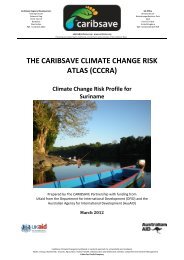Create successful ePaper yourself
Turn your PDF publications into a flip-book with our unique Google optimized e-Paper software.
6.1.4. Climate Change Education <strong>and</strong> Awareness<br />
The previous section on communication <strong>and</strong> networking relates directly to the sharing of information to<br />
assist decision making <strong>and</strong> planning. However, without education <strong>and</strong> awareness raising on climate change<br />
<strong>and</strong> the likely impacts of climate change on specific sectors the information shared will be meaningless. The<br />
research in a number of sectors highlighted specific areas that need additional efforts in education <strong>and</strong><br />
awareness:<br />
Disaster risk reduction <strong>and</strong> emergency preparedness at the household level;<br />
Water conservation, rain water harvesting <strong>and</strong> other collection techniques for households, as well<br />
as water treatment;<br />
The importance of energy <strong>and</strong> the role of emissions in climate change, specifically knowledge about<br />
energy, its generation, <strong>and</strong> the economic <strong>and</strong> environmental importance of energy;<br />
Climate-related diseases <strong>and</strong> health promotion, particularly malaria <strong>and</strong> diarrhoea <strong>and</strong> the<br />
development of linkages with the agricultural sector to reduce malnutrition <strong>and</strong> improve food<br />
security;<br />
Impacts <strong>and</strong> costs of SLR to communities, but also to the public <strong>and</strong> private sectors, because of<br />
these damages have implications for livelihoods <strong>and</strong> sustainable development.<br />
Due to the interrelated nature of some environmental issues <strong>and</strong> natural processes collaboration between<br />
different sectors can reinforce learning amongst the general public while also providing synergistic benefits<br />
for resources. Creative methods for public education <strong>and</strong> awareness have been developed. For example,<br />
the use of mobile phone technology can allow vital information to reach individuals during emergency<br />
situations. Research at the community level revealed that not all persons have cell phones, so this<br />
technique requires complementary messages to be transmitted through more traditional mediums, radio<br />
<strong>and</strong> television. In addition, building awareness of the issues mentioned above can be better embraced<br />
when the message is conveyed by a respected figure. Children <strong>and</strong> youth have been found to be good<br />
transmitters of basic environmental information.<br />
Education <strong>and</strong> Awareness Projects for In-bound Tourists: Films can be effective tools in influencing human<br />
behaviour. Short videos encouraging visitors to be more conscious of their impacts on the fragile<br />
ecosystems of the isl<strong>and</strong>s can be shown during in-bound international flights. The films will focus on<br />
positive actions that visitors can take to minimize negative impacts on the environment by decreasing<br />
energy <strong>and</strong> water consumption <strong>and</strong> wastage, <strong>and</strong> by taking necessary precautions during marine based<br />
recreation (diving, snorkelling, boating). The films will be geared towards showing viewers how their<br />
vacation experience will be enhanced if they use environmentally friendly practices.<br />
Film production will engage as much local expertise as possible including actors, cameramen, technicians<br />
etc. Other stakeholders will include the various tourism organizations. By reducing anthropogenic stresses<br />
on the environment, ecosystem health will improve <strong>and</strong> become better able to cope with climate change.<br />
6.2. Water Quality <strong>and</strong> Availability<br />
The Government of the <strong>Turks</strong> <strong>and</strong> <strong>Caicos</strong> Isl<strong>and</strong>s is planning appropriate measures for water resources<br />
under climate change through the National Socio-economic Development Framework (2008-2017): National<br />
Socio-economic Development Strategy (DEPS, 2007b) <strong>and</strong> the <strong>Turks</strong> <strong>and</strong> <strong>Caicos</strong> Isl<strong>and</strong>s Climate Change<br />
Green Paper (Climate Change Committee, 2011), outlined in Section 5.1.1. These measures are broadly<br />
supported here. In addition, the following recommendations are made:<br />
170





